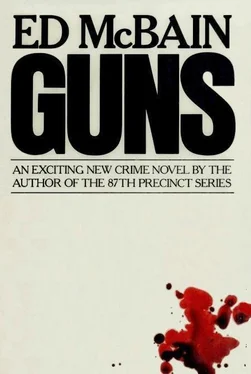“Yeah,” Colley said.
“I got back to the house, it must’ve been a little after twelve, she asked me was there any pot left? I tell her we’re all out of pot, why don’t she try some of the real stuff? She shrugs and says why not? She’s been shooting a nickel bag a day ever since. She’s half hooked already. Few more days, I’ll have her on the street peddling her ass. How you like that?” he said, and laughed.
Colley laughed too.
“Listen, you sure you don’t want to spend the night?” Benny said.
“No, I got to get going,” Colley said, and stood up.
“Paisan,” Benny said, and beamed like a pope again, his arms wide, his head tilted, his palms open in benediction.
The police cars were gone.
Colley went up the street and looked in the pizzeria, see if there were any guys there he knew. There was only a black guy sitting in one of the booths near the juke box, girl with him had an Afro looked like the bride of Frankenstein in blackface. Colley’d seen that picture on television, couldn’t tell whether it was supposed to be a put-on or not. He guessed not. He guessed it was just such an old movie that it seemed funny, even when it was supposed to be scary. He nodded to the bartender, and the bartender nodded back, but Colley figured the guy didn’t know him from a hole in the wall. He went outside into the hot August night again. Two black girls were standing in the doorway to his mother’s building.
“Well, well,” one of them said.
The other one pursed her lips and made a kissing sound.
Colley went right by them. Hookers in his mother’s building, great. His brother Al kept saying it would be traumatic to move their mother out of the building. His brother Al was thirty-five years old. He was a Buick dealer in Larchmont; Albert L. Donato, it said on his brother’s showroom window. The L stood for Lawrence, but Al never told anybody what his middle name was. Lawrence sounded faggoty to Al. Al had gone to college for two years, planning to become an accountant; he’d changed his mind when the opportunity to buy into the Buick dealership came along. An uncle in New Jersey had put up the money for the dealership. Uncle Nunzio. Dear old Uncle Nunzio. When Colley got busted the first time — this was when they had the club, and he shot Macho Albareda in the throat — Uncle Nunzio wouldn’t go the bail for him. Set Al up in an automobile agency at the age of twenty-one but wouldn’t go the five-hundred bail for his other nephew. Nice man, Uncle Nunzio. They finally had to ask Al for it, which Colley’s mother hadn’t wanted to do, which was why they’d gone to Uncle Nunzio in the first place. Al was always using words like “traumatic” or “personality disorder” or “acting-out neurotic.” He especially used “personality disorder” when he was talking to Colley man-to-man.
“Nick,” he would say — he was the only person on earth who called him Nick — “I want to talk serious to you. I understand, Nick, from what Mama tells me, that you didn’t learn too much while you were in jail.”
“I learned a lot while I was in jail, Al.”
“Yes, I’m sure. But I’m not talking about what you might have learned from people who are acting-out neurotics,” Al said. “Mom tells me you came home only to pick up your clothes, and then you moved right out again, that you’re living someplace downtown...”
“Al, I’m twenty-eight years old, that’s a little old for somebody to be living with his mother.”
“Nick, I want to tell you something...”
“Yes, Al.”
“Nick, when a man lives by the gun...”
“Yes, Al, I know.”
“He dies by the gun.”
“Yes, Al, you told me before.”
“And a man who has to commit robberies...”
“Yes, Al.”
“Is a man with a serious personality disorder.”
That particular conversation had taken place just before Christmas. Colley had met Jocko a few days afterwards, and they had done their first job together on Christmas Eve. Colley supposed Jocko had a personality disorder, too. He knew one thing for sure. It had certainly been traumatic tonight in that liquor store. It had certainly been traumatic pulling the trigger of the .38 and watching the back of that cop’s head come off and splatter onto the Seagram’s poster. Yes, Al, that was traumatic. That was probably more traumatic than moving Mom out of this building full of hookers would be.
He began climbing the steps to the third floor. There were cooking smells contained in the building, and they blended with the heat of the day to create an overpowering stench that almost knocked him back down the stairwell. The cooking smells were alien. When he was a kid growing up in this building, the smells were always Italian, promising feasts at best, or at the very least, simple meals that were wholesome and familiar. He never felt at home in any apartment that wasn’t Italian; the cooking always smelled of worlds he could never hope to fathom.
There was this kid he used to work with in the stockroom of a company downtown, this was before he joined the club, before he got busted that time. Colley was just fifteen, he remembered he had to get working papers in order to take the job. The kid was Jewish, he lived down on Hester Street, the Lower East Side. One time, after work, he asked Colley would he like to come home for supper with him. Colley went, and when he got in the house there was an old Jewish man reading his newspaper, and cooking smells in the house, those strange cooking smells. The food turned out to be pretty good, Colley couldn’t figure out how, with all those funny cooking smells.
Later, him and the kid sat on the front stoop and talked. The kid said he wanted to be an opera singer. Told Colley he was studying Italian in high school because lots of operas were in Italian and he wanted to be able to sing every opera there was in the world. They tried talking a little Italian together, but Colley spoke only what he’d learned from his grandparents, which was the Neapolitan dialect, and the kid spoke what he’d been taught in school, the Florentine, so they had a difficult time of it. Colley couldn’t remember the kid’s name any more. He always wondered whether the kid had made it as an opera singer. That had been fourteen years ago; if the kid was going to make it, he’d have made it by now.
Colley knocked on the door to his mother’s apartment.
He waited. He could hear sounds everywhere around him in the building, Johnny Carson’s voice clearly identifiable in the apartment next door to his mother’s, upstairs someone shouting, a toilet flushing someplace; he rang the bell again, and then looked at his watch. It was twenty minutes to one, but this was a Saturday night, and he didn’t expect his mother to be asleep so early on a Saturday night. She’d either be watching television — he didn’t hear anything inside there — or else out playing poker with her friends. He reached into his pocket for his key chain. He carried a key to the apartment only because his mother insisted on it.
“Suppose I’m away sometime, and you want to come in?” she said.
“Mom, you never go away,” he said.
“I went away that time to Daytona Beach.”
“Mom, that was six years ago.”
“So? I could still go away. How do you know?”
“Mom, if you did go away, why would I come up to the Bronx?”
“You might want to use the apartment,” she said. “Take the key, Colley, please. Suppose something happens to me? I’m not getting any younger, you know.”
“That’s right, Mom, you’ve got one foot in the grave.”
“You’d at least have a key, you could open the door and see if I was dead.”
“Mom, you’re only fifty years old. Not even fifty.”
Читать дальше










